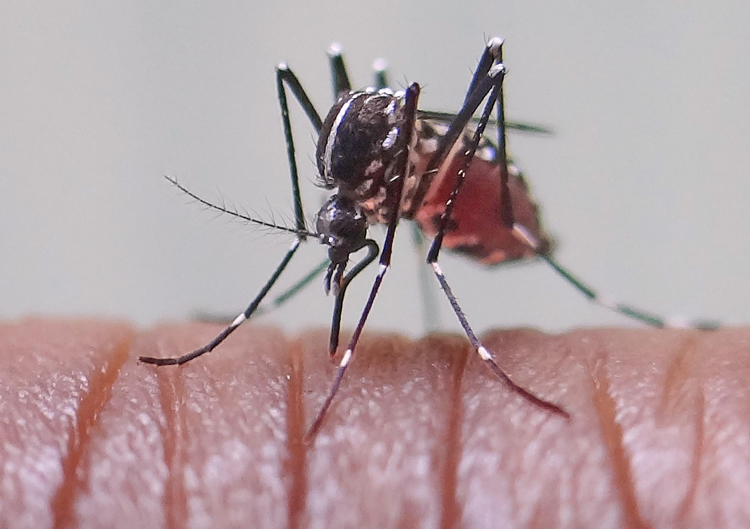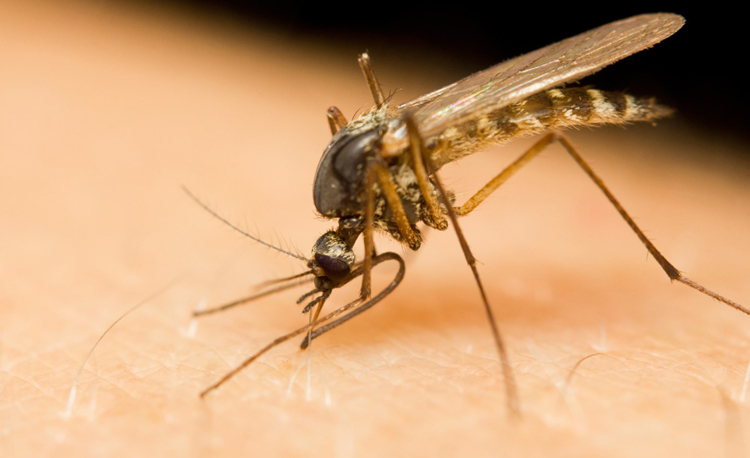Not all mosquitoes are created equally. Do you know the differences between Culex and Aedes mosquitoes?
First, let’s discuss what these two mosquitoes have in common. When it comes to obtaining a blood meal for the purpose of reproduction, both mosquitoes are the same. Both have four life stages – egg, larva, pupa, and adult. Female Culex and Aedes mosquitoes lay their eggs in water, and both are potential vectors for harmful diseases. Even with these general similarities, these two mosquito genera have many differences.

Aedes mosquito
About Aedes Mosquitoes
This genus of mosquitoes includes the Aedes aegypti, known as the yellow fever mosquito, and the Aedes albopictus, also called the Asian tiger mosquito. In addition to yellow fever, these mosquitoes are vectors for chikungunya, dengue fever, and zika virus. If you have ever been bothered by an incessant mosquito, whizzing and buzzing around your head while trying to do yard work or enjoy time by the pool during the day, it was an Aedes mosquito. This is because Aedes mosquitoes are ravenous daytime feeders. As you see in the photo above, these little blood suckers have distinctive black and silver (or white) markings. They prefer to lay their eggs in fresh water.

Culex mosquito
About Culex Mosquitoes
The Culex genus includes the Culex pipiens, or northern house mosquito. The Culex pipiens mosquito is the most common one found in the northeastern United States. Culex mosquitoes are also loud and obnoxious pests. They will whine around in search of a blood meal. While they prefer feeding at dusk and dawn, they are also known to bite at night. As for the bite of a Culex mosquito, well it can be dangerous, like the Aedes. Some of the diseases carried by the Culex genus include West Nile virus, St. Louis encephalitis. Culex mosquitoes will lay their eggs in polluted water.
Why do some mosquitoes prefer biting at night?
Scientific studies have recently uncovered that certain mosquito species and sexes are attracted to or repelled by different colors of light at different times of day. Day-feeding Aedes mosquitoes are attracted to a wide range of colors of lights during the daytime. Mosquitoes use this light to navigate closer to their preferred targets. For this reason, it is wise to choose dark or dull colors when you are outdoors during the day. Nighttime-feeding mosquitoes use light the same way and were highly sensitive to shortwave lights, such as blue and ultraviolet. This display of photophobia is one of the reasons that bug zappers do not effectively control mosquitoes. They are just not attracted to light like other pests.
Avoid mosquito bites with Hingham mosquito control.
 Whether you like spending time outdoors during the day or night – or both – I recommend hiring a professional mosquito control company to help protect you from biting mosquitoes. Effective Hingham mosquito control solutions are available in traditional and all-natural formulas. Both formulas are time-released, which means that you will have protection from two weeks to 21 days, depending on the one you choose.
Whether you like spending time outdoors during the day or night – or both – I recommend hiring a professional mosquito control company to help protect you from biting mosquitoes. Effective Hingham mosquito control solutions are available in traditional and all-natural formulas. Both formulas are time-released, which means that you will have protection from two weeks to 21 days, depending on the one you choose.
If you are attending outdoor activities away from home, wearing light-colored clothing, long sleeves, and pants will help protect you from mosquito bites. In the heat of the day, this might not be comfortable, but you will be better protected. At the very least, use DEET on uncovered skin.
Also read: Where did EEE originate?

Dave Macchia, Central Mass Mosquito Control Expert
